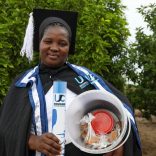Mozambique: "The only solution is to build positive peace" - Yussuf Adam
First Lady launches National Health Week

O País (File photo) / Isaura Nyusi
Mozambique’s First Lady, Isaura Nyusi, on Monday launched the vaccination component of National Health Week, during which 4.4 million children aged between six and 59 months should be vaccinated throughout the country.
During the central launch ceremonies, held in the southern town of Namaacha, on the border with Swaziland, she also administered the first dose of Vitamin A supplement and of the deworming drug mebendazole. These components of National Health Week are aimed at 3.7 million children aged between 12 and 59 months.
During the week, an event which has been held annually since 2008, the health authorities will also step up family planning activities, and hope to distribute various types of contraception to 560,000 women of child-bearing age.
Speaking at the ceremony, Isaura Nyusi said that during this week the government intends to boost basic preventive health care interventions, protecting family health through a package of high impact but low cost measures.
“We’re here to launch National Health Week through which we intend to raise the coverage of interventions on nutrition, vaccination and mother and child health in our country”, she declared.
She added that mothers, or other people caring for children under five years of age, should take the children to the nearest health unit or mobile brigade.
In addition to the vaccination, deworming and vitamin A supplements, children will be screened for tuberculosis, and their nutritional status will be assessed. The health staff will also register any children who were not registered at the time of their birth.
As part of the drive against breast cancer, led by the First Lady’s office, in collaboration with the Health Ministry, women who attend health units during this period will also be taught the importance of self-examination of their breasts.
“If breast cancer is detected early, then its treatment can be less invasive and traumatic”, stressed Nyusi.
There was no guaranteed method of preventing breast cancer, she added, but such measures as a healthy and nutritional diet, regular exercise and reducing the consumption of alcohol were advisable. Breast feeding of infants, at least during the first six months of life, and preferably until they are two years old, could also reduce the risk of developing cancer.
The deputy representative in Maputo of the United Nations Children’s Fund (UNICEF), Michel le Pechoux, pledged continued UN support for the Mozambican national health system, in order to guarantee that good quality health and birth registration services are offered to the entire population.
“National Health Week complements the health and nutrition services that are offered in the health units”, he said.
Vitamin A supplement, added le Pechoux, will improve the body’s defences against infections, while mebandazole will help eliminate intestinal worms and boost the nutritional status of children.
Nutritional screening during the week was important, he said, “in order to identify children with acute malnutrition and send them to the nearest health unit, so that they can be treated as soon as possible”.
The early diagnosis of tuberculosis in children, particularly in children suffering from acute malnutrition, he continued, was essential in order to begin treatment at the initial stage of the disease.













Leave a Reply
Be the First to Comment!
You must be logged in to post a comment.
You must be logged in to post a comment.